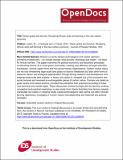Green grabs and biochar: Revaluing African soils and farming in the new carbon economy

Download
Date
2012-04-19Author
Fraser, James
Fairhead, James
Leach, Melissa
Metadata
Show full item recordImpact
Abstract
Biochar currently attracts technological and market optimism, promising multiple wins – for climate change, food security, bioenergy and health – not least for African farmers. This paper examines the political-economic and discursive processes constructing biochar as a novel green commodity, creating new alliances amongst scientists, businesses, venture capital firms and non-governmental organisations. Carbon market logics are not only threatening large-scale land grabs for biochar feedstocks but also other forms of resource, labour and ecological appropriation through driving research and development and shaping small-scale pilot projects. In these, soil carbon is ‘chopped out’ of its ecosystem and social contexts and revalued as exchangeable pieces of carbon nature. Farmers are hailed as green actors and market winners, provided they discipline their practices according to these new technical and market logics. These discourses contrast strongly with the farmers' existing conceptual and practical repertoires; a case study from Liberia illustrates how farmers already manipulate soil carbon in creating locally valued anthropogenic dark earths, but within diverse farming repertoires, ontologies of human–nature interrelationship and historical and political ecologies.
Citation
Leach, M., J. Fairhead and J. Fraser, 2012, ‘Green grabs and biochar: Revaluing African soils and farming in the new carbon economy’, Journal of Peasant Studies, 39:2.Rights holder
Taylor and FrancisCollections
- ESRC STEPS Centre [225]
